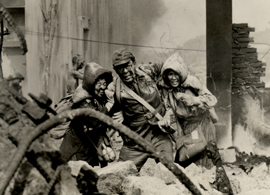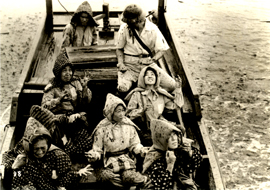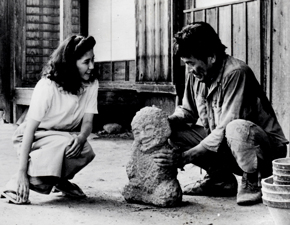
 |
|
|
|
Over sixty years later, political debate about the Hiroshima and Nagasaki bombings shows no sign of resolution. American movies and television miniseries on the bombings have understandably been made from the victor's point of view. MGM's unrepentant Above and Beyond (1952) presents a highly biased U.S. Army version of events. Later Hollywood productions frequently downplay the wartime context and emphasize the bombing as an unjustifiable atrocity. American occupation censorship prohibited Japanese filmmakers from addressing topical issues for almost seven years after the surrender, but independence brought no wave of historical introspection. Akira Kurosawa's forthright look at atom-age anxiety I Live in Fear (Record of a Living Being) did not start a trend. A few Japanese fantasies (1954's Gojira) approached the issue, but only at a stylized remove. Science fiction scare pictures from the height of the Cold War (The Last War, The Final War) pictured Japan as a helpless pawn trapped between dominant aggressor nations. 
The United States censorship and military secrecy have left harrowing personal accounts as the only record of the post-bombing horrors. In 1989 Japanese director Shohei Imamura (Pigs and Battleships, The Insect Woman, Vengeance is Mine (Kuroi ame) ) made Black Rain from Masuji Ibuse's account of the lingering effects of the bombing. Perceiving the need to remind his country of the truth of the atomic horror, the normally confrontational director exercises notable restraint. Imamura called his approach "a quiet voice" but his movie is emotionally wrenching just the same. Young Yasuko (Yoshiko Tanaka) has relocated to Hiroshima to be safe from firebombings and avoid conscripted labor in a war factory. Although she's not in the city when the atom bomb hits, she returns immediately by boat and is caught in a shower of 'black rain' -- precipitation filled with radioactive soot from the mushroom cloud. Yasuko joins her uncle Shigematsu and aunt Shigeko (Kazuo Kitamura & Etsuko Ichihara) to cross the devastated city, avoiding fires and downed power lines. They come across blast victims both dead and alive that they can hardly bear to look at. Shigematsu's company supervisor sends him to a Buddhist monastery for a crash course in administering last rites to the dead. Five years later, Yasuko is living with her Uncle and Aunt in a rural community. They're acutely aware that the Americans may use atomic weapons in the Korean conflict. Some of their neighbors are blast victims with chronic radiation-sourced illnesses. All live with the possibility that they may fall sick and die without warning. The apparently healthy Yasuko attempts to find a husband through a matchmaker, only to be turned down when her prospective in-laws learn of her undesirable status as a Hiroshima survivor. Nobody really knows what the long-term effects of radiation poisoning will be, but nobody is optimistic. Then the community is hit by a wave of sickness and death. Yasuko isn't convinced that her legal bill of health document will spare her, as she entered the city on the first afternoon of the bombing. And of course, there was that black rain ... 
Black Rain sees the bombing as a twofold curse upon Yasuko. Although everyone's case is different, the damage done by radiation acts like a delayed fuse, hitting years after the exposure. The townspeople monitor their red blood cell count and set their hopes on various kinds of home remedies like drinking fish blood. Others fall back on Buddhist faith healers. Yasuko has become a social pariah in a community that considers her damaged goods. Just by mentioning Hiroshima, her matchmaker sees a good marriage arrangement ruined. When an eager and desirable suitor shows up, she can't help but tell him of her status. He doesn't care, but his family immediately withdraws from the wedding plan, without explanation. The actual bombing is depicted in several episodes spread out through the narrative. Yasuko watches the mushroom cloud from several miles away, but Uncle Shigetmatsu and Aunt Sigeko are right in town when the blast hits. Shigematsu's train car is overturned and his face is cut, but otherwise both he and his wife are unscathed. When Yasuko joins them they decide to go to Uncle's company by crossing through the center of town. Many survivors are wounded and burned, and many are in shock; others cry out from beneath burning buildings. A boy is convinced that a horribly burned "thing" is his brother only after he recognizes his brother's belt. At the city center, dead bodies have been turned into human-shaped pieces of charcoal -- adults, children and babies. Yoshiko Tanaka is highly sympathetic as the teenaged Yasuko, a cute girl with normal ambitions who sees her life reduced to an ever-narrowing set of unhappy choices. She eventually gravitates toward Yuichi (Keisuke Ishida), a mentally ill sculptor who suffers from a serious wartime stress disorder. The two outcasts find a brief calm in each other's company. 
Black Rain is clearly designed as a memorial to the victims of Hiroshima and Nagasaki, for a world too quick to forget. A final pacifist sentiment declares that, in terms of human suffering, an unjust peace is always preferable to a just war. For all its depiction of the horrors of the bombing, the film is remarkably free of political bias. One bitter criticism reportedly leveled at Above and Beyond is its contention that the U.S. Army Air Corps dropped leaflets over Hiroshima warning the city's residents to evacuate, an event that the critic claimed never happened. But Black Rain, a Japanese film taken from eyewitness reports, shows the leaflets are being dropped. Despite the fact that the American military suppressed and distorted facts of the bombing, Imamura's film demonstrates that misinformation still persists on both sides of the argument. AnimEigo's DVD of Black Rain is a quality disc that far surpasses the original 1998 Image release. The sharp enhanced B&W image captures the film's original range of grays. The string-heavy score by Toru Takemitsu does not reach for sentimental effects. AnimEigo's carefully researched subtitles include "footnote" subs explaining unfamiliar phrases. An impressive selection of extras begin with a surprise, a seventeen-minute discarded color ending that brings the story to a close in 1965. It's a toss-up as to whether the alternate ending should have been retained. Although we're happy to see the film reach closure -- even one as strange as this -- the color footage is a stylistic departure from what has gone before. Yoshiko Tanaka's makeup and acting are very convincing in this almost religious coda. Ms. Tanaka also appears in a newer interview, admitting that she has never seen the other ending until now. Director Takashi Miike speaks briefly about the hard work of assisting Shohei Imamura. AnimEigo's generous text files clarify concepts brought up in the film's dialogue and sketch the basics of the still-current controversy over President Truman's decision to drop the bomb. A multimedia gallery presents several American short wartime information films designed to foster hatred of the Japanese people and encourage their extermination. This fine DVD edition of Black Rain is an excellent place for the uninformed to begin an examination of the Hiroshima bombing. Reference: Article Black Rain: Reflections on Hiroshima and Nuclear War in Japanese Film, Robert Felippa, 2003, Crosscurrents
On a scale of Excellent, Good, Fair, and Poor,
Black Rain rates:
Reviews on the Savant main site have additional credits information and are often updated and annotated with reader input and graphics. Also, don't forget the 2009 Savant Wish List. T'was Ever Thus.
Review Staff | About DVD Talk | Newsletter Subscribe | Join DVD Talk Forum |
| ||||||||||||||||||